As more high-net-worth individuals turn their attention to Singapore, they value more than just “low taxes.” They seek comprehensive advantages encompassing living environments, wealth protection, public services, and educational futures.

I. From “Hot” to Wealth Magnet
Why Has Singapore Become the New Favorite for Global Wealthy Immigrants?
If you fly from Beijing to Singapore in winter, your first sensation upon landing is often—heat! But this “heat” isn’t just about temperature; it’s an irresistible allure that makes many choose to stay.
Especially for China’s high-net-worth individuals, they bring not just suitcases and wallets, but also their children, businesses, and even life plans spanning decades.
Compared to former hotspots like Hong Kong, Australia, and North America, Singapore has emerged as the new favorite among the wealthy in recent years. The reason goes beyond mere “low taxes”—it’s a comprehensive “package deal” encompassing environment, policies, and services.
Data shows that the 2025 World’s Wealthiest Cities Report ranks Singapore among the top four global cities for the wealthy. New York City leads with 384,500 millionaires, followed by the San Francisco Bay Area (342,400) and Tokyo (292,300). Singapore ranks fourth with 242,400 millionaires (net worth exceeding $10 million), having seen a 62% surge in its wealthy population over the past decade—outpacing traditional financial hubs like Hong Kong.
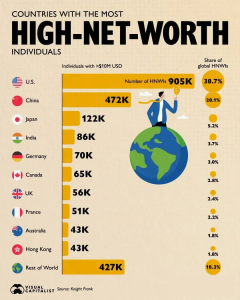
*Data and charts sourced from Knight Frank
The global wealth landscape is undergoing a restructuring, with North America and Asia emerging as the “dual powerhouses.” The United States commands 39% of the global share with 905,000 high-net-worth individuals, while mainland China (475,000) and Hong Kong, China (43,000) collectively contribute 22%. Against this backdrop, Singapore’s breakthrough signifies the first time a Southeast Asian city has entered the world’s top tier of wealth management destinations.
This article will comprehensively analyze Singapore’s unique advantages in attracting global immigrants across four dimensions: “Living Environment, Wealth Protection, Public Services, and Education & Future Prospects.”

II. Living Environment
The Unique Appeal of a Tropical Island
1. Pleasant Climate, No Winters
Located near the equator, Singapore enjoys a tropical rainforest climate with no seasonal changes. Temperatures consistently range between 25–33°C (77–91°F). For many families from northern China, this means no more smog or cold snaps, and no need for dry indoor heating.
Instead, residents enjoy year-round comfort in short sleeves. While some complain it’s “too hot,” air conditioning has become an indispensable part of daily life in Singapore—from the MRT and shopping malls to buses, cool air is everywhere. For many affluent individuals, comfort is a fundamental requirement, and Singapore’s climate perfectly meets their need for warmth and stability.
2. Safety and Security in a Law-Abiding Society
According to data from Lianhe Zaobao and the Singapore Police Force, Singapore consistently ranks among the world’s safest countries. Violent crime is virtually nonexistent on the streets, and women and children can walk at midnight without fear of lurking shadows.
This stems from a rigorous legal framework: from narcotics and firearms to littering, clear statutes and hefty fines govern every offense. For the wealthy, this sense of social stability is particularly crucial. After all, when you possess considerable wealth, the greatest fear isn’t losing money—it’s the sudden onset of unforeseen calamities.
3. No Mosquito Nuisance? Almost True
Many first-time visitors to Singapore are surprised: “A tropical country, yet so few mosquitoes?” This is actually the result of government management. The National Environment Agency (NEA) invests significant resources in dengue fever prevention and control year-round, with an annual “Mosquito Control Week” and regular pesticide spraying in residential and public areas.
The result? Most people barely notice mosquitoes in the city. For those naturally targeted by mosquitoes—especially children in affluent families—this is an immense, unseen benefit.
4. Prime Geographical Location: Global Crossroads
Flights from Singapore to Shanghai or Beijing take under 6 hours; it’s also roughly midway to Europe and the United States. Singapore’s Changi Airport has been consistently ranked the world’s best airport for years, serving not only as Southeast Asia’s hub but also a key factor for multinational corporations choosing locations.
For wealthy individuals and entrepreneurs who frequently travel between continents, Singapore’s geographical advantage translates to efficiency and convenience.
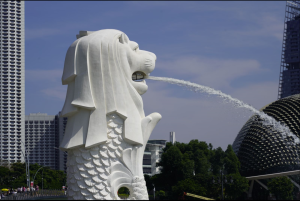
Photo: Singapore’s Merlion

III. Wealth Protection
Low Taxes and Clear Property Rights
1. Tax Advantages: A Streamlined Tax System
Compared to the complex tax structures of Europe and America, Singapore’s tax system can be summed up in four words: simple and transparent.
Personal income tax employs a progressive rate, with the top bracket capped at just 24% (FY 2024 data)—significantly lower than most Western nations.
There is no capital gains tax or inheritance tax.
Corporate income tax stands at 17%, with additional relief policies for startups and certain industries.
According to data from Singapore’s Ministry of Manpower (MOM) and Inland Revenue Authority of Singapore (IRAS), this tax regime is highly attractive to multinational corporations and high-net-worth individuals. Consequently, an increasing number of Chinese entrepreneurs are establishing family offices in Singapore.
2. Clear Land and Property Ownership
Singapore’s real estate ownership system is transparent and well-defined. Properties can be purchased with 99-year, 999-year, or freehold titles, with each type’s specific rules clearly outlined in the contract, leaving no room for ambiguity.
For the wealthy, clear property rights ensure long-term asset stability. Compared to land expropriation risks or unclear property rights in some countries, Singapore’s transparency allows wealth to “settle securely.”
3. Minimal Social Obligations, Less Distraction, Relaxed Living
Another unspoken reason many affluent individuals choose Singapore is the absence of endless social engagements and intrusions. Here, civil servants won’t suddenly visit your home for “tea,” and there’s far less pressure from extraneous social connections.
For entrepreneurs accustomed to complex networks, life in Singapore allows for a genuine “family and career-centered” existence, reducing unnecessary energy expenditure.
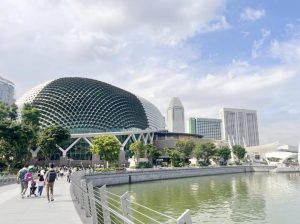
Photo: Singapore

IV. Public Services
A Well-Ordered Modern Metropolis
1. Human-Centered Public Facilities, Scientific Planning
Despite its small land area, Singapore’s urban planning sets a global benchmark. Roads, MRT, and bus systems interlock seamlessly, virtually eliminating “traffic gridlock.” According to the Land Transport Authority (LTA), Singapore’s public transport punctuality rate exceeds 90%.
Furthermore, public space development prioritizes functionality and sustainability, eschewing vanity projects. This pragmatic approach ensures the comfort and efficiency of daily life for affluent families.
2. Comprehensive Healthcare and Public Health System
Data from Singapore’s Ministry of Health (MOH) shows the country’s life expectancy at birth reaches 84 years, ranking among the world’s highest. This achievement stems from an efficient healthcare system: from government-subsidized public hospitals to advanced private clinics, all provide top-tier medical services.
For families considering immigration, healthcare conditions are often as important as education. Notably, Singapore’s healthcare system balances efficiency with affordability, ensuring accessibility across all income brackets.
3. Stable and Transparent Governance
Beyond public safety and the rule of law, Singapore possesses an invisible advantage: highly efficient government administration with virtually no corruption. According to Transparency International, Singapore consistently ranks among the world’s top ten most corruption-free nations.
For high-net-worth individuals, this translates to confidence in investing and residing without fear of hidden risks from “unwritten rules.”
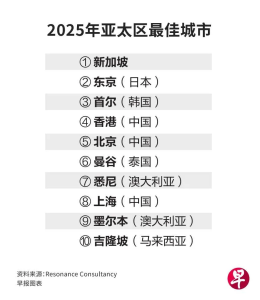
Source: Lianhe Zaobao
![]()
V. Education and Future Prospects
Nurturing Children’s Growth and Shaping the Next Generation’s Stage
1. High Educational Standards with East-West Integration
As highlighted on the Ministry of Education (MOE) website, Singaporean students consistently rank among the world’s top performers in mathematics, science, and reading literacy in the Programme for International Student Assessment (PISA). The country offers both a top-tier public school system and international/private education options.
Crucially, Singapore is one of the few nations providing both high-quality Chinese and English education. Children can retain their Chinese language proficiency while seamlessly transitioning into Western educational systems. For many Chinese families aiming for their children’s admission to prestigious Western universities, this is a decisive factor.
2. Multilingual Environment, Natural Language Advantage
English is the official working language, while Mandarin, Malay, and Tamil are also official languages. On the streets, you’ll hear fluent English and see Chinese signage. This environment allows children to naturally acquire multiple languages in daily life, equipping them to thrive whether studying abroad or pursuing careers on the global stage.
3. Global Stage, Long-Term Development Potential
Singapore serves not just as a “landing point” but as a “springboard.” Children raised here gain direct access to world-class universities or internships/careers at multinational corporations. For affluent families, immigration transcends mere relocation—it unlocks global development pathways for the next generation.
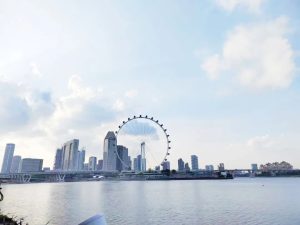
Photo: Singapore
Conclusion: Why Are More People Choosing Singapore?
When we connect Singapore’s advantages, we see it’s not just about “low taxes,” but a comprehensive package of “safety, transparency, comfort, efficiency, and educational excellence.” It meets the wealthy’s demand for asset security, safeguards their children’s growth, and offers a stable living environment.
Some joke: “If you’re particularly afraid of mosquitoes, particularly afraid of the cold, and particularly afraid of hassle, then Singapore is your ideal country.” For many Chinese affluent individuals, Singapore is that place where they can set aside their anxieties and live peacefully with their families.
So, the next time you’re sipping coffee on Orchard Road and encounter a Mandarin-speaking “new neighbor” beside you, don’t be surprised—they’ve likely just completed a significant “migration upgrade” in their life.
Note: Reference materials sourced from Singapore’s MOM, MOF, ICA, MOE, MOH, Knight Frank’s “World’s Richest Cities Report 2025,” Lianhe Zaobao, and other news reports. Reproduction requires attribution; contact for removal if infringing…….
